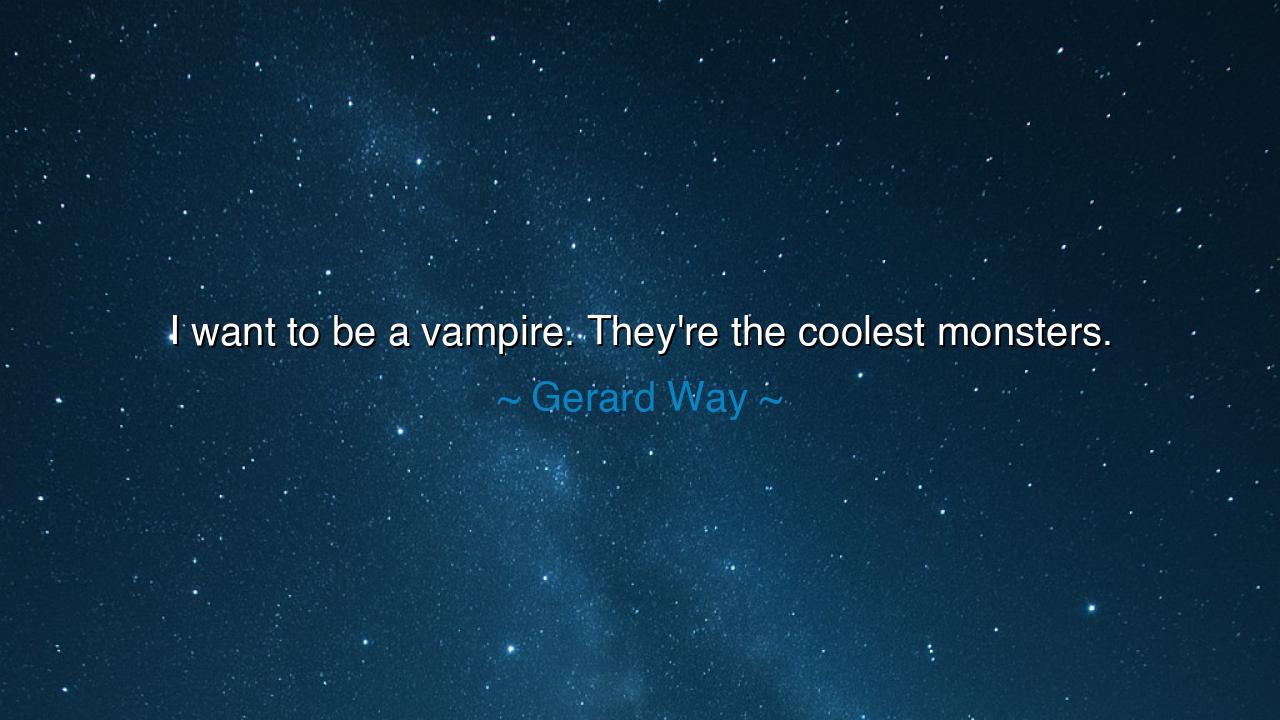
I want to be a vampire. They're the coolest monsters.






In the realms of myth and legend, creatures of darkness have always captivated the human imagination. Among these, the vampire stands as a symbol of both immortality and the mystery of the human condition. Gerard Way’s words, "I want to be a vampire. They're the coolest monsters," speak to a fascination with the supernatural, a desire to transcend the limits of human existence and embrace the allure of the undead. Vampires, in their eternal nature, represent a deeper yearning for power, freedom, and the unconventional. Yet beneath this desire for coolness, lies a reflection of human nature—a longing to embrace something that stands apart from the mundane and the ordinary.
The ancients, too, were drawn to myths and legends that explored the unknown. In Greek mythology, gods like Hades and Persephone, rulers of the Underworld, wielded power that transcended the mortal realm. Hades, though not a monster in the traditional sense, embodied the mystique of death and the afterlife—qualities that many feared, but also revered. Like vampires, these deities held sway over life and death, their powers both feared and admired. Just as Gerard Way expresses his fascination with vampires, the ancients were fascinated by beings that stood outside the boundaries of mortality, powerful yet marked by their otherness.
The vampire, as an enduring symbol of immortality, represents both a gift and a curse. Count Dracula, perhaps the most famous of all vampires, embodies this duality. In Bram Stoker’s Dracula, the vampire is depicted as an immortal being who is both alluring and repellent. His immortality is a gift that transcends human existence, yet it comes at the cost of humanity, love, and even connection. Vampires, in their eternal nature, are forever suspended between life and death, cursed to seek life yet unable to partake in it fully. This paradox of being immortal yet empty mirrors many of our own desires—our longing for power, for transcendence, but at times, at the cost of true connection and human experience.
Consider the story of Faust, the tragic hero who made a pact with the devil to gain knowledge, power, and immortality. Faust’s story, much like the vampire’s, reveals the dangers of desiring eternal life without considering the consequences. Faust’s bargain with Mephistopheles, the devil, grants him immeasurable power, but at the cost of his soul. In the end, his unending quest for knowledge and immortality leaves him spiritually empty, demonstrating that even the coolest of desires—such as those reflected in the vampire’s eternal life—can lead to unforeseen despair. Gerard Way’s longing to be a vampire may reflect a desire for freedom and power, but it also hints at the tension between life and death, between what is truly fulfilling and what is merely alluring.
The lesson in Gerard Way’s quote, as well as the ancient and literary tales of vampires, is a reminder of the dangers of longing for things that seem too good to be true. The vampire represents the eternal allure of escaping human limitation, but it also symbolizes the dangers of pursuing a path that ultimately leads to loss. Immortality, in this sense, is a double-edged sword, and the coolness of eternal life may come with unintended consequences. Power without purpose, freedom without connection, can leave the soul empty, wandering through time, disconnected from the very essence of life.
In our own lives, we must ask ourselves: what do we seek in the immortal? Is it the power to transcend the limitations of the human experience, or is it the deep connection to life itself, to those around us, and to the legacy we leave behind? Let us be careful not to be seduced by the surface allure of things that promise perfection or endlessness, without understanding the cost that may come with them. True greatness, like the eternal sun rising and setting, is found not in escaping time, but in embracing life with all its limitations and impermanence.
To live a fulfilling life, we must seek not to be vampires who escape the cycles of life and death, but heroes who live fully in the moment, knowing that our time here is precious. Instead of seeking immortality, we must focus on creating a legacy that endures through our actions, our values, and the impact we have on others. The coolness of a vampire’s power is alluring, but the coolness of a life well-lived, one that embraces imperfection and humanity, is far more enduring and fulfilling. Embrace life with all its beauty and its limitations, for that is the truest form of immortality.






AAdministratorAdministrator
Welcome, honored guests. Please leave a comment, we will respond soon